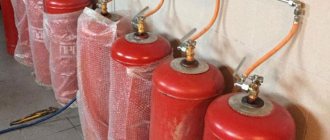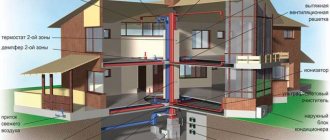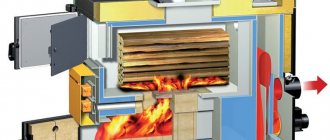Which heating is cheaper and more profitable for a private home: gas or electric? Many will immediately say: of course, gas! It is several times cheaper, and having a gas pipe nearby is the dream of every summer resident.
In fact, not everything is so simple. In most cases, it is actually more profitable to heat a house with gas than with electricity. But this is if you compare these two methods in terms of the size of monthly bills. If you take into account all the costs, including connection, equipment and operation, the electrical system often looks more profitable.
In this article we will try to understand this issue objectively. And to do this, you need to thoroughly study all the pros and cons of both heating systems and compare all costs.
We heat the house with electricity
There are two main types of electric heating systems on the market today:
- water heating;
- and using convectors.
The first type requires the presence of a coolant, which is heated and supplied through the heating system to the rooms that need to be heated.
As with any water system, a boiler is naturally needed here to heat the water in the pipes. This type of heating is very effective, since water has great thermal inertia.
With convector heating, a large number of radiators are installed to heat each room. They can be installed to operate autonomously, or they can be combined into a common system with unified control.
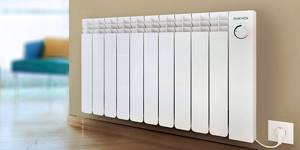
Installation of such a heating system is quite simple and does not require a lot of materials. It is enough to fix the convector on the wall and supply 220V power to it. Affordable prices and ease of installation are the main advantages of this type of heating.
Choosing an energy carrier based on ease of use
Comfortable operation of boiler equipment that supplies heat to water heating is an important factor, since any unnecessary hassle and inconvenience is your time and money. That is, total costs indirectly increase in accordance with how much effort is put into maintaining the operation of the system. In some cases, economical heating systems no longer seem so economical after the first season, and sometimes you want to pay extra money just not to deal with such problems.
Unlike financial indicators, ease of use is a constant value for each type of fuel, so it can be found out immediately, which will help you make a choice. We will evaluate convenience according to the following criteria:
- the difficulty of repairing or maintaining the boiler installation;
- necessity and convenience of storage;
- comfort in daily use (need for loading fuel, etc.).
To find out which energy carrier will provide comfortable and economical heating for a private home, we will draw up a second table, where for each of the criteria we will rate all types of fuel using a five-point system, and then summarize.
Service
Electric boilers do not require any maintenance, other than sometimes opening the lid and brushing off dust or cleaning the contacts, for which they receive the highest rating. Some actions are required if you heat a country house with liquefied gas. Once every 2 years it is recommended to check and, if necessary, clean the igniter and burner, which is why propane is a solid four. Pellet boilers receive 3 points because they require cleaning the combustion chamber several times a year and the chimney once.
Accordingly, wood and coal units need to be cleaned frequently as they become dirty. The worst situation in this regard is with diesel fuel, since its quality often leaves much to be desired, which is why the frequency of maintenance is unpredictable.
Warehousing
It is clear that electricity does not require storage space, while liquefied gas and diesel fuel may require some space. But when economical heating of a private house with wood is organized, then a lot of space for a warehouse will be required. The same goes for pellets, since they require a dry room or a special silo. As for coal, it produces a lot of waste, dust and dirt, so this is the lowest rating.
Ease of use
And here, economical electric heating turned out to be excellent, since it does not require any intervention during operation. Pellets and liquefied gas must be replenished periodically, 1-2 times a week, or even less often. You should pay attention to diesel fuel a little more often, more to supervise the work than to add fuel.
Well, what traditionally causes the most trouble is autonomous heating in a private house using coal and wood; here, loading into the combustion chamber is needed from 1 to 3 times a day.
In the last column, by summing up, the results are summed up, according to which the most comfortable and convenient way is to heat a country house in winter using electricity. If this result is considered in conjunction with financial costs, then electricity may not be the worst option.
We heat with gas
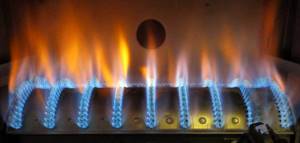
Gas heating can rightly be considered more profitable if the gas pipe is located in close proximity to the house. To save on connecting to the highway, it is recommended to use the following rules:
- All services must be ordered in one place. This includes design, installation and subsequent service;
- It is necessary to properly prepare the place for the boiler;
- The boiler itself must correspond to the area of the house;
- You should choose the optimal size of the chimney.
The main advantage of gas heating is the low cost of energy. However, in essence, all the advantages end there.
Gas boilers
To heat housing, methane is mainly used, which is supplied through main pipeline systems and distribution networks. At the moment, this is the most economical way to heat a private home.
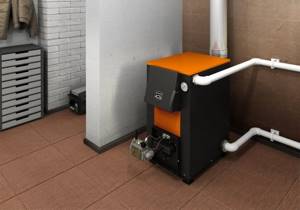
In areas where gasification has not yet been carried out, gas tanks with a liquefied propane-butane mixture can be used.
A modern gas boiler is fully automated and ensures that the desired temperature in the house is maintained depending on weather conditions. This allows you to reduce fuel consumption during warming, helping to save money in the family budget.
At the same time, gas prices are rising, which, coupled with the high costs of purchasing and installing the appropriate equipment and obtaining permission to operate it, makes the use of this type of fuel not so profitable.
Comparison of gas and electricity costs. What is the price difference?
Let's try to make a simple calculation and see how much more expensive it is to heat a house with electricity compared to gas.
We will assume that a private house needs to be heated for five months a year. Let's take into account that there will be not only cold days, but also warm ones, so we divide the energy consumption by 2.
In total, it will take approximately 27,000 kW of energy to heat a house throughout the year.
Tariff prices of suppliers this year in the Moscow region are:
- 4.0 rub. for 1 cubic meter of gas;
- RUB 3.80 for 1 kilowatt of electricity.
It is easy to calculate that the cost of heating a house with electricity will be 102,600 rubles per heating season.
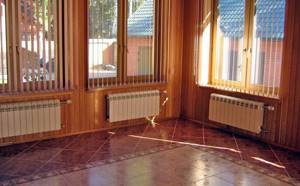
Now let’s compare how much you will have to spend if you use gas and install a boiler with a power of 24 kW and a productivity of 2.84 cubic meters. m. per hour.
When heating a private house, 8.45 kW of heat comes out from one cubic meter of gas. Let’s take into account the boiler efficiency equal to 90%:
8.45 x 0.9 = 7.61 kW.
As a result, we find that during the same heating season, 3,548 cubic meters of gas will be consumed, the total cost of which will be 14,192 rubles .
If you compare two houses of the same area, one of which is heated by main gas and the other by electricity, the monthly heating costs of the first will be more than 7 times cheaper.
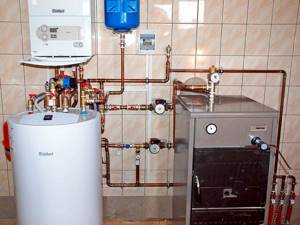
Of course, this is a significant difference. But let's look ahead and make calculations for the future, for example, 15 years. Let's add here the costs that will be required to install a gas heating system:
- To connect to the gas pipeline in the Moscow region you will have to spend at least 600-700 thousand rubles;
- Annual maintenance of a gas boiler costs 8 thousand rubles, over 15 years this amount will grow to 120 thousand rubles;
- Let’s take into account the replacement of the boiler (and it will clearly exhaust its service life during this period) - another 50 thousand rubles;
In total, we will receive 978 thousand rubles of additional expenses.
To sum it up, we have that in 15 years we will spend 1,539,000 rubles . If we heat with gas, during the same period we will spend 1,090,880 rubles . The difference is 1.5 times.
Taking into account the costs of connection, equipment and maintenance of a gas heating system, in the long term, the benefit from gas is no longer so obvious - 1.5 times. And given the fact that electric heating does not require large investments at the stage of building a house, this will be a more comfortable solution for many owners.
Alternative energy sources
There is no clear answer to this question, since each individual case has its own nuances. For example, on your plot of land there are many old large trees that are just asking to be used to fire a wood-burning boiler.
Option two: in exchange for certain services, the customer is ready to supply you with diesel fuel or coal for a long time. It is clear that in such situations you will be inclined to these types of energy carriers and not pay attention to others. In the long term, this will be a mistake, since such sources will sooner or later dry up and you will have to look for other ways to heat a country house or buy the same fuel, but at a generally accepted cost.
We will try to develop some kind of universal method for determining the optimal energy carrier for heating a home, which will suit each individual case. First, let’s make a reservation that the methodology will help you determine for yourself the cheapest heating without gas; we do not take it into account.
We also don’t take into account various high-tech and exotic types of heating that are inaccessible to ordinary citizens. This includes heat pumps, solar panels, wind turbines and various types of machine and vegetable oils. Then how to heat the house if there is no gas and the above sources? We still have at our disposal:
- ordinary firewood;
- Euro firewood;
- pellets;
- coal;
- diesel fuel;
- liquefied gas in cylinders;
- electricity.
For each of these energy sources, you should calculate the costs for the entire cold period, then it will be clear how cheaper it is to heat a house.
Important! Before starting calculations, it is imperative to harmonize the units of measurement of the amount of fuel, that is, to prevent confusion between volume (m3) and mass (kg). It is recommended that all types of energy carriers, except electricity, be converted to units of mass - kilograms.
Summarizing all of the above
Weighing all the pros and cons, all the pros and cons, we can definitely say the following: if the house was purchased with gas heating already connected, then of course it is not worth changing it.
If you are not ready to invest almost a million rubles in your house so that it has gas, and the speed of heating the rooms is also important to you (in this regard, gas heating loses to electric heating), it is better to give preference to electric heating.
The fact is that electrical systems do not have this drawback, especially if you use a boiler-air system. The whole trick of quick warming up is convection - room air is taken in by the system, then heated and returned to the room, taken in again, and so on in a circle. Such systems are characterized by very high efficiency - and produce more heat than they consume energy.
Solar collectors
If the house is located in the southern region, then solar collectors can be chosen as an alternative heat source. At constant above-zero temperatures outside, they are quite capable of heating water for hot water supply and heating. In cold regions, solar panels cannot cope with the task. There is not enough daylight for good accumulation of collectors.
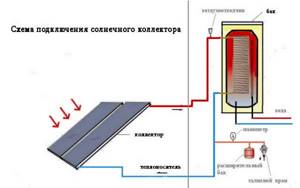
Interesting: How to insulate walls to prevent condensation
Alternative and hybrid heating systems
Taking into account the regular rise in fuel prices, it is logical to assume that the most economical way to heat a home is the one in which the latter is not needed at all. Such heating systems exist - these are solar collectors and heat pumps.
The effectiveness of the first option seems very doubtful - taking into account the peculiarities of the Russian climate, it can only be considered as an addition to the main equipment.
Heat pumps are a truly innovative technology. Residential and other premises in a private house are heated using low-temperature energy from the earth's interior. The main disadvantage of a heat pump is the high costs of purchasing and installing equipment; its payback period in our country is up to 10 years.
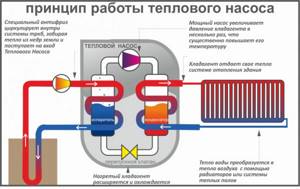
If you are forced to choose which heating is the most economical, it makes sense to think about combining the most efficient systems. The use of parallel installed equipment will reduce your space heating costs by using cheaper fuel depending on the situation. You can also buy a solid fuel boiler with built-in heating elements and equip it with a gas burner.
Electric heating
In recent years, the popularity of electric boilers has been gaining momentum. When choosing the most economical heating, our compatriots are increasingly giving preference to electricity. This method of heating rooms has a number of advantages:
- Low prices for electric boilers, convectors and components for heated floors.
- Relative ease of installation - even a non-specialist can lay power wiring in any room and install the boiler there.
- Autonomy and efficiency - the system turns on with the onset of cold weather and does not require attention until the end of winter. At the same time, the automation maintains the set temperature.
Of course, gas will cost several times less than electricity, but, nevertheless, the use of the latter is justified, first of all, in rural areas. Here, tariffs are lower, and with subsidies and the installation of a two-zone meter, electric heating becomes a fairly profitable option.
Universal liquid fuel models
More often, specialists have to install high-quality air-type heating for a summer residence, since a comfortable temperature is maintained in all rooms. Boilers running on diesel fuel, fuel oil, waste oil, or kerosene cannot function as an independent unit.
Therefore, the master must provide for a reliable connection of the equipment to the heating system of the wood-burning cottage with batteries, radiators or registers that are located in each room. It is necessary to provide for the availability of free space for installing the boiler and prepare a site for energy storage.
The room must be ventilated and equipped in accordance with fire safety rules.
For a country house, you can choose systems with one or two circuits. The second option is relevant when, in addition to heating, you need to provide water heating for domestic needs. The dual-circuit system can be equipped with a boiler or a flow-through heater. According to their design, liquid fuel boilers are either floor-mounted or wall-mounted.


